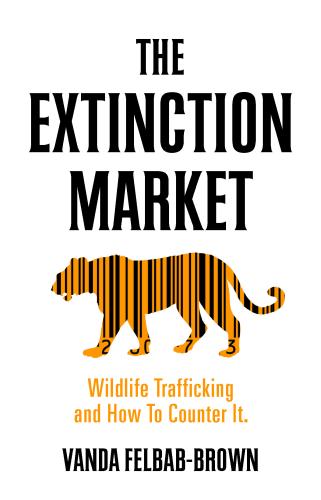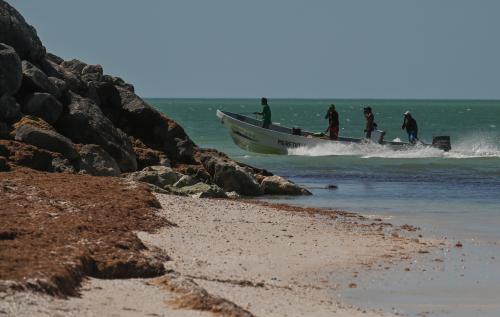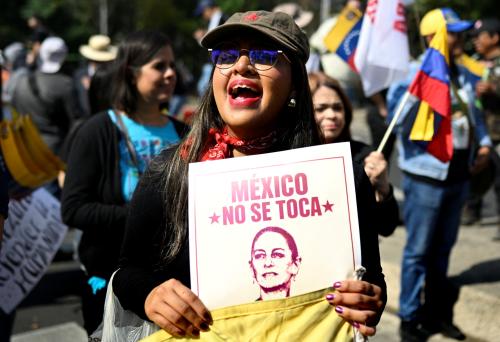This piece is part of a series titled “Nonstate armed actors and illicit economies in 2022” from Brookings’s Initiative on Nonstate Armed Actors.
Wildlife trafficking from Mexico to China receives little attention, but it is growing and threatens biodiversity. Moreover, while the connections between wildlife trafficking and drug cartels are sometimes exaggerated, in Mexico, wildlife trafficking, drug trafficking, and money laundering have become intertwined. Attracted by China’s enormous appetite for wildlife products and in contact with Chinese traders supplying precursor chemicals for the production of illegal fentanyl and methamphetamine, Mexican drug cartels are increasingly muscling their way into the country’s legal and illegal wildlife trade.
This blog previews a detailed report of mine to be published by the Brookings Institution later this month. It is part of a Brookings series of reports and blogs on China’s role in wildlife, drug, and human trafficking. The report and blog are based on over 100 interviews I conducted between October and December 2021 in various parts of Mexico and via virtual platforms with China-, Asia-, and Europe-based counternarcotics, law enforcement, and government officials, business community representatives, investigative journalists, scholars, and environmental activists.
The poached species
For decades focused on wildlife products from Asia and Africa, Chinese traders started sourcing natural resources from Mexico about a decade ago. In Mexico, Chinese traffickers source various reptile species, including turtles for their meat and pet trade, and crocodilian skins. Mexico’s jaguar poaching, long-mostly retaliatory kills by cattle ranchers, also increasingly appears to be connected to Chinese markets. Mexican environmental NGOs operating along the border with Guatemala and Belize are finding jaguar carcasses without paws, teeth, and other body parts, suggesting this loot is heading into China for traditional Chinese medicine, as has happened elsewhere in Latin America. China’s role in the trafficking of Mexico’s marine species is even more extensive, or at least better known. Unregulated or illegally harvested marine products sold to Chinese buyers include shark fin, sea cucumber, lobster, abalone, shrimp, clams, oysters, and jellyfish.
The most notorious case of poaching in Mexico involves the endemic protected totoaba fish. Soup made from its swim bladder is considered a delicacy in China. The extraordinarily valuable bladder is also a form of investment and speculation in China, with large dried aged bladders selling for as much as $60,000-$85,000 per kilo. The gillnets the fishers use to illegally capture the totoaba also entangle and drown a very rare porpoise, the vaquita, of which approximately only seven or eight remained as of November 2021. Despite decades of conservation efforts, gillnet fishing for the totoaba (and shrimp) has decimated the vaquita population, with numbers down 99% in the last decade.
Hardly all poaching and wildlife trafficking in Mexico is linked to China. Many poached animals, such as tarantulas, hummingbirds (killed for making love amulets), and orchids are sold in Mexico and to Mexican communities in the United States. Parrots still head predominantly across the U.S. border. Many smuggled reptile skins also go to U.S. markets, desired by Hispanic communities for clothing.
Legal wildlife trade from Mexico to China, while having the potential to provide important income to local communities to incentivize the preservation of ecosystems and species, sometimes launders poached animals. Such laundering is prominent in the case of crocodilian skins as well as sea cucumber, abalone, and other marine species. Illegal fishing accounts for a staggering proportion of Mexico’s fish production even in species permitted for offtake and export.
The criminals
As my fieldwork interviews revealed, Mexican organized crime groups, especially the Sinaloa Cartel, are seeking to monopolize both legal and illegal fisheries along the entire vertical supply chain. Prior to that criminal takeover, Chinese traders often directly interacted with Mexican fishers, such as in the first years of sea cucumber harvesting off Yucatán and initially in abalone and totoaba poaching on the Pacific coast.
But in their monopolization drive, Mexican criminal groups have pushed out Chinese traders from direct purchases from local fishers. Mexican criminal groups now sell to Chinese traders who then ship the contraband from Mexico to China, sometimes through the United States.
Conversely, Chinese traders’ interest in an animal or plant species and efforts to source them in Mexico for Chinese markets attract the attention of Mexican criminal groups. In southern Mexico, for example, Chinese traders themselves first organized local communities to illegally log various rosewood and granadillo trees. The interest of the Chinese traders then drew Mexican criminal groups into the illegal logging.
Poaching and wildlife trafficking in Mexico does not merely pose threats to Mexico’s biodiversity. Both can be sources of dangerous zoonotic diseases, such as the coronavirus COVID-19, and facilitate their spread. Yet systematically weakening environmental protection, Mexican President Andrés Manuel López Obrador’s government is not interested in instituting robust zoonotic disease monitoring controls, Mexican environmental activists and U.S. government officials told me. Mexico’s capacities to take samples from poached or otherwise deceased animals to identify possible zoonotic diseases, and efforts to inspect wildlife products crossing Mexico’s borders — procedures in which the United States was training Mexican environmental officials a decade ago under its zoonotic disease detection program PREVENT — have more or less evaporated. On the U.S. side too, only a very small fraction of animals legally crossing U.S. borders are inspected for disease.
Worrisomely, the López Obrador administration eviscerated the budgetary and personnel resources of Mexican government regulatory environmental agencies. Even before it came to power, many environmental agencies were weak, lacking mandates, rangers, and resources for enforcement against environmental crimes and were pervaded by corruption, but this traditionally weak enforcement has become essentially non-existent.
Mexico-China wildlife trade is also becoming a mechanism to transfer value in illicit economies and bypass anti-money-laundering controls in U.S. and Mexican banks. As my interviews with current and former U.S. and Mexican government officials, Mexican environmental activists, and Mexican seafood producers showed, more and more various animal and timber products are used by the cartels to pay for drug precursor chemicals from which the Mexican cartels produce fentanyl and methamphetamines to be shipped to the United States and elsewhere. The huge markups that wildlife products register between harvest and retail make them an ideal tool of money laundering and value transfer.
Such value transfer across two illicit economies goes beyond one trafficking network smuggling multiple commodities as, for example, detected in the 2020 U.S. Operation Apex that targeted Chinese nationals in the United States smuggling totoaba bladders and shark fins from Mexico as well as drugs, diamonds, and precious metals.
The amount of value generated by wildlife commodities in Mexico may be only a small percentage of what Mexican cartels owe to Chinese brokers for precursors. Many other methods of money laundering are used. Drazen Jorgic’s Reuters report details Chinese informal money transfer systems that — through mirror transactions in Mexico, China, and the United States — cleanse the cartels’ proceeds while enabling Chinese businesses and citizens to evade China’s capital controls. These Chinese money transfers are even displacing established Colombian and Mexican money launderers.
Wildlife barter will not displace other methods of money laundering and value transfer. But the increasing role of this payment method can devastate biodiversity in Mexico, as the cartels seek to legally and illegally harvest more and more of a wider and wider range of animal and plant species to pay for precursors.

The policies
Former Mexican diplomats told me that drug and wildlife smuggling challenges do not feature prominently in China-Mexico diplomacy. For the most part, the Chinese government rejects China’s responsibility for the smuggling of precursors into Mexico, and for poaching and wildlife trafficking in Mexico for Chinese markets, and mostly insists that these problems are for the Mexican government to solve. Cooperation has been minimal and sporadic. Beijing has not been keen to formalize either China-Mexico or China-Mexico-United States cooperation against either illegal trade, preferring informal case-by-case cooperation.
Nonetheless, every so often, under intense international pressures, the Chinese government has taken law enforcement actions, such as in 2018 moving beyond seizures of the totoaba bladder smuggled to China from Mexico to conducting interdiction raids against retail markets. They pushed the visibility of illegal retail out of public scrutiny — behind closed doors and onto private online platforms — but trafficking continues.
However, the dominant position of the Chinese government has been that it is up to the Mexican government to enforce its laws and counter poaching and wildlife and drug trafficking in Mexico. But the prospects that Mexico could do it alone are poor, given the disinterest of the López Obrador administration in protecting Mexico’s biodiversity or confronting Mexican organized crime groups increasingly involved in poaching, wildlife trafficking, and illegal logging. Like many other civil society actors in Mexico, environmental defenders face violent intimidation: Between 2012 and 2019, at least 83 were murdered.
Mexico thus needs all the international collaboration it can get, including from China, to reduce poaching and wildlife trafficking. Such collaboration requires both China’s interdiction cooperation and actions to reduce demand in China for wildlife products smuggled from Mexico. Since the López Obrador administration has exhibited little interest in environmental protection, perhaps the Biden administration can bring up the issue in the recently resurrected North American leaders summit.
The Brookings Institution is committed to quality, independence, and impact.
We are supported by a diverse array of funders. In line with our values and policies, each Brookings publication represents the sole views of its author(s).









Commentary
Something fishy: Wildlife trafficking from Mexico to China
March 8, 2022